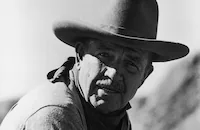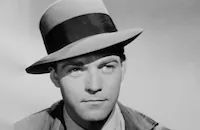Bad Guy

Brief Synopsis
Cast & Crew
Edward Cahn
Bruce Cabot
Virginia Grey
Edward Norris
Jean Chatburn
Cliff Edwards
Film Details
Technical Specs

Synopsis
Hard-living linesmen "Lucky" Walden decides to get his money back from some crooked gamblers despite warnings from his loyal brother, Steve Carroll. Because they refuse to return the money plus "interest," Lucky hits one of them with a wrench, then hides the body in the bathroom when some other gamblers arrive. They turn out to be policemen, however, and find the man dead. Lucky is then convicted of murder and sentenced to death, despite his plea of self-defense. While Lucky awaits execution, Steve searches for Ned Burns, a missing witness to the incident whom Lucky claimed would corroborate his story. When Steve receives a tip and finds Burns, he backs up Lucky's story, convincing the governor to commute the sentence to life in prison, even though the police suspect that Burns is lying. Later, after Lucky heroically tries to save the life of a fellow prisoner burned by high voltage wires, the warden helps him get a parole. After assisting the power company with some daring emergency work, Lucky gets a job as a linesman again, and resumes his old, rule-breaking ways. Steve, who is in love with his girl Kitty, plans to marry her, unaware that she and Lucky are also attracted to each other. After Lucky slugs a man foolishly showing children how to fly a kite under power lines, he is picked up for violating parole and learns that Burns has told the truth about the murder. When Steve hears Lucky's story about the re-arrest, however, he doesn't know that the real cause is the slugging. Lucky then convinces Steve to rig the electricity in the elevator to the prison's bars so that he can "burn" his way out of jail. Though Steve doesn't want to run away, Lucky convinces him to accompany him after he calls Kitty. When policeman Dan Gray confronts Kitty with the truth about Lucky's double dealings, she tells him to look for them at the power station. There, as the police go after Lucky, Steve tries to convince him to turn himself in, but Lucky knocks him unconscious before climbing the high wires. He is killed when workmen turn the electricity on, and Steve is arrested for helping Lucky break jail. Gray then summons Kitty to the police station to tell Steve what Lucky really was like so that after his short jail sentence he will be free to start a new life.

Director
Edward Cahn
Cast

Bruce Cabot

Virginia Grey

Edward Norris
Jean Chatburn

Cliff Edwards

Warren Hymer

John Hamilton

Clay Clement

Charles Lane
Horace Macmahon
Norman Willis
Harry Jans
Garry Owen
Paul Everton
G. Pat Collins

Roy Gordon
Joe Caits

Huntley Gordon
Eddie Dunn
Don Brodie
Mary Dees
Edith Trivers
Bobby Watson
Leonard Penn
Roger Converse
Ivan Miller
James Blaine
Jack Grey
Hal Le Seuer

Alan Curtis
Philip G. Sleeman
Harry Tyler
Mahlon Hamilton

Don Douglas
Monte Vandergrift

E. Alyn Warren
Jules Cowles
Richard Cramer

Roger Moore
Barbara Bedford
Lester Dorr
John Dilson
Jerry Tucker
George Billings
Dick Rich
Frank O'connor
Charles Mcmurphy
George Guhl
Ralph Bushman
Ben Taggart
Richard Allen

Lee Phelps
Paddy O'flynn
Gertrude Simpson
Baldwin Cook
Polly Vann
Charles Dunbar
Harry Semels
Drew Demorest
Ernie Alexander
Bob Davis
Eddie Hart
Dutch Schlickenmayer
Dutch Hendrian
Ethan Laidlaw
Crew
J. Robert Bren
Earl Felton
Cedric Gibbons
Leonard Lee
Ben Lewis
Hal Long
Tom Reed
Harry Ruskin
Gabriel Scognamillo
Douglas Shearer
Kathleen Shepherd
Edward Ward
Lester White
Edwin B. Willis
Walter Wise
Dolph Zimmer

Film Details
Technical Specs

Articles
Virginia Grey (1917-2004)
She was was born in Los Angeles on March 22, 1917, and was exposed to the film industry at a very young age. Her father, Ray Grey, was a Keystone Cop and acted in several other of Mack Sennett's comedies with the likes of Mabel Normand, Dorothy Gish and Ben Turpin. When her father died when she was still a child, Virginia's mother encouraged her to join the acting game and audition for the role of Eva for Uncle Tom's Cabin, a big budget picture for Universal Studios in the day. She won the role, and acted in a few more pictures at the studio: The Michigan Kid and Heart to Heart (both 1928), before she decided to temporarily leave acting to finish her schooling.
She returned to films after graduating from high school, and after bouncing around Hollywood doing bits for various studios, she hooked up with MGM in 1938. Her roles in her first few films were fairly non-descript: In Test Pilot and Ladies in Distress (both 1938), she did little more than look pretty, but in the following year she had scene-stealing parts in The Women (upstaging Joan Crawford in a delicious scene as a wisecracking perfume counter girl) and as the suffering heroine in Another Thin Man (both 1939).
Despite her versatility (she could handle comedy or drama with equal effectiveness), MGM would cast her in some above-average, but hardly starmaking movies: Whistling in the Dark, The Big Store (both 1941), and Tarzan's New York Adventure (1942). She left MGM in 1943 and became a freelance actress for several studios, but her material as a leading lady throughout the '40s were mediocre: Swamp Fire, House of Horrors (both 1946), and Mexican Hayride (1948) were sadly the more interesting films in her post-MGM period. But by the '50s she was a well-established character actress, appearing in fairly big-budget pictures: All That Heaven Allows, The Rose Tattoo (both 1955), Jeanne Eagels (1957).
In the '60s, Grey turned to television and found work on a variety of hit shows: Wagon Train, Peter Gunn, Bonanza, My Three Sons, I Spy, and several others; plus she also captured a a couple of notable supporting parts in these films: Madame X (1966), and Airport (1970), before retiring completely from acting in the early '70s. She is survived by her sister, Lorraine Grey Heindorf, two nieces and two nephews.
by Michael T. Toole

Virginia Grey (1917-2004)
Quotes
Trivia
Cast lists records list Norman Willis (Edwards), but he was replaced by Russell Hopton. In addition, the following actors are also listed in records but did not appear in the film: Philip Sleeman (Convict), Harry Tyler (Convict), Monte Vandergrift (Candy Salesman), E. Allyn Warren (Night Watchman), Jules Cowles (Bartender), Richard Cramer (Dr. Wilson), Barbara Bedford (Mrs. LeClair) and Baldwin Cooke (Spectator).
Notes
According to Variety and Screen Achievements Bulletin, the title of the original story was "High Voltage." The working title of the film was Black Lightning. Although Motion Picture Daily reviewed the film as Bad Boy, that title was never used elsewhere. There is no explanation given within the story of why brothers Steve and Lucky have different surnames.















